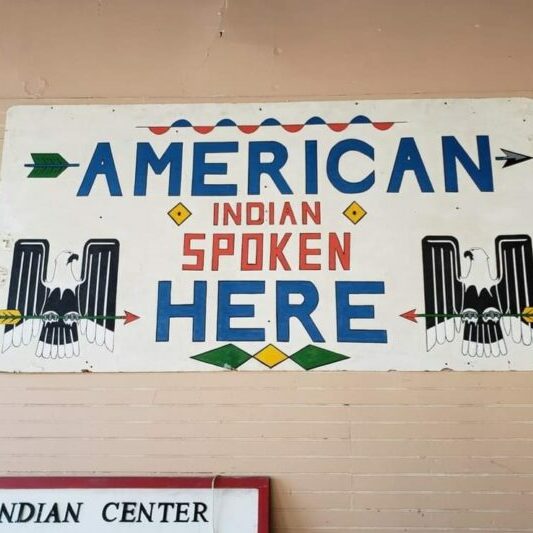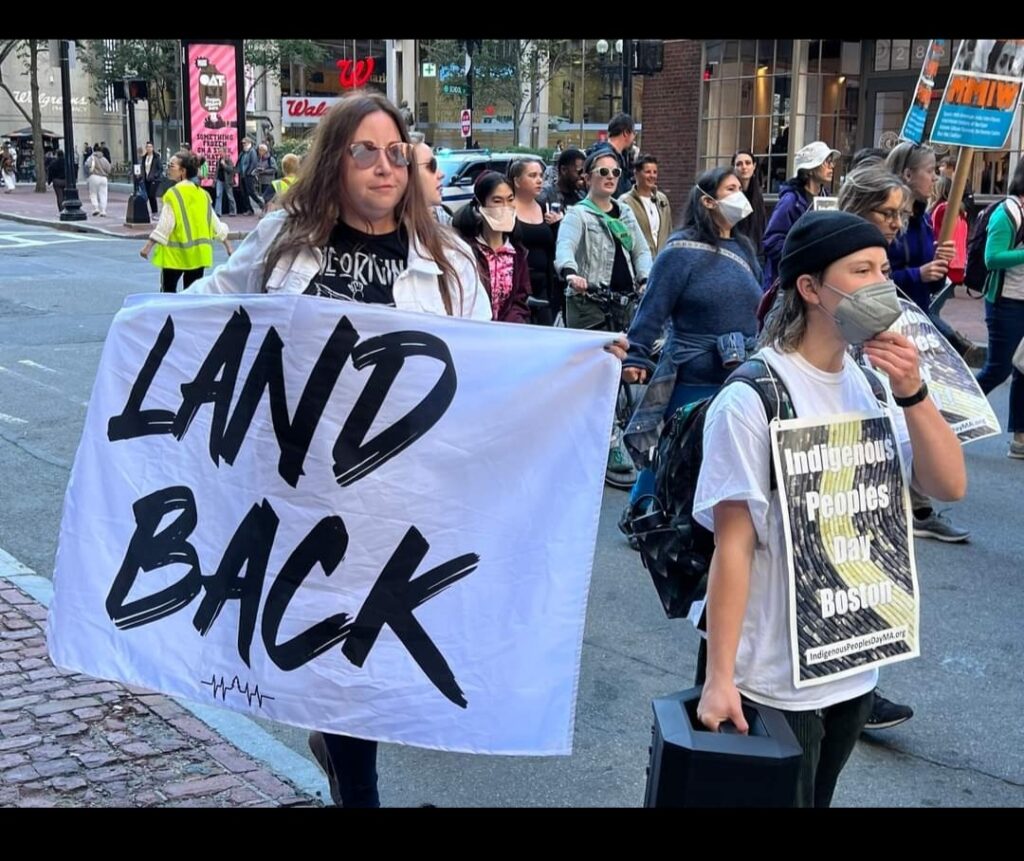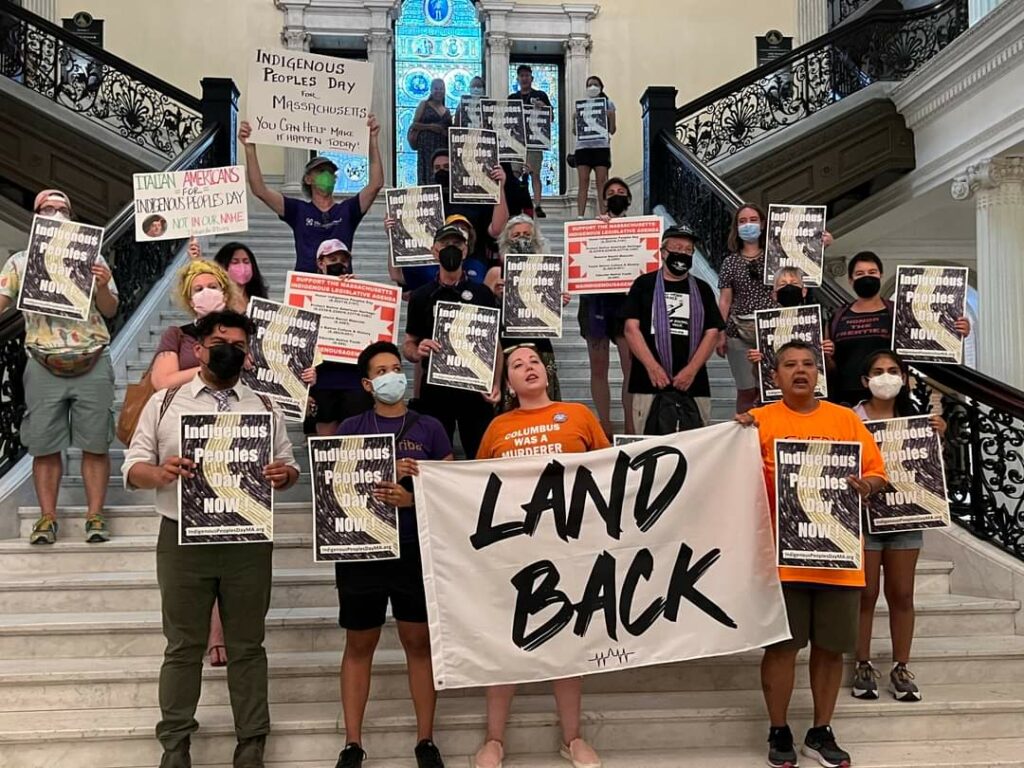
We’re searching for the Indigenous voices of Cambridge
Above Image: A banner at the North American Indian Center of Boston is by Sage Carbone.

By Beth Folsom, 2023
History Cambridge created a land acknowledgment in 2018 as a commitment to doing good history and telling the whole story of the place we now call Cambridge. Though acknowledging our occupation of Indigenous land is an important step in recognizing the presence of Indigenous (Native American/American Indian) peoples and nations in a colonial nation that was formed through genocide, we must also make a continued effort to learn from and engage with the past and present histories of Indigenous peoples and nations in the spaces we occupy. The creation of our Indigenous Peoples History Hub marked the beginning of these efforts; over time we hope to expand the hub to fill the gaps in recorded history and uplift the stories and voices of Indigenous peoples – past and present.
Last month, History Cambridge was awarded a grant from the Cambridge Community Foundation to begin research on the history of Indigenous peoples in Cambridge over the past 400 years. This work is long overdue. One of America’s founding documents, the Declaration of Independence, uses the term “merciless Indian savages” to describe Indigenous peoples. Over the last century, there has been little education made available to the general public on the Indigenous communities of New England. And yet, we sense collective curiosity and an urgent need to have these conversations across our Cambridge community. To that end, we intend to survey the current educational offerings in Cambridge and highlight or create resources for young adult and adult audiences.

As part of these efforts we want to know from you, the public: How did you learn about Native American/American Indian people? We have created a feedback form where you can share experiences of learning about Native America, whether in school, through community education programs and/or personal and family histories. Your experiences and memories will be helpful primary source material for our scholars.
History Cambridge is leading a coalition of individuals and organizations committed to commemorating the 400th anniversary of the founding of Cambridge in 2030. Together we will develop inclusive programs that inspire the people of Cambridge to think critically about our past and apply lessons learned for our future. It is essential to note that the invasion of white settlers on land that remains the traditional homelands and property of the Massachusett tribe brought about the division of land. Settler colonialism not only displaced the Indigenous peoples of this region; it is also responsible for the land boundaries we see today.
From Natick to Ponkapoag, we read a disbursement of Massachusett (Ponkapoag) life, culture and history that is the direct result of their forced removal from traditional homelands, which were renamed after colonizers (e.g. King Charles) or mischievously renamed through colonial references to Indigenous peoples who were assumed to no longer exist (e.g. The Commonwealth of Massachusetts). With this, be mindful that the history of the Massachusett (Ponkapoag) Tribe goes far beyond the boundaries of Cambridge, and that many of this nation’s members exist within and outside of our community today.
This project is a test case for a larger, multiyear project that will develop longer-term strategies for highlighting Indigenous history throughout the city. It is imperative that we start this project now as the country gears up for America’s 250th anniversary (in 2026) and Cambridge 400 (in 2030). Without this groundwork, there is a high probability that Indigenous stories will be excluded from these anniversary narratives.
For this project, History Cambridge will partner with Indigenous communities in Cambridge (people from the Massachusett Tribe and other Native American/American Indian nations) to develop public programs highlighting this rich history, up to the present day. Properly developing a framework for decolonizing the history of Cambridge is a significant, multiyear undertaking. This project is an opportunity to begin a restorative process by making connections, forming friendships and partnerships and demonstrating to the larger Indigenous community of Cambridge and surrounding areas that History Cambridge is sincerely committed to learning and sharing the history that we previously ignored.
We are pleased to be working with two Indigenous scholars on this project. Sage Carbone is a member of the Northern Narragansett Tribe of Rhode Island and an East Cambridge resident. She is a graduate of Wheelock College, where she majored in humanities with a focus in History and minors in visual arts, sociology and human rights, and of Simmons University, where she received a dual master’s degree in business administration and communications management. Carbone is a co-founder of Cambridge City Growers, a neighborhood organization that rematriates underused spaces to grow food and manages the Coast Community Fridge at the Cambridge Community Center, including with 2021 funding support from the Cambridge Community Foundation.
David Shane Lowry is an anthropologist and member (citizen) of the Lumbee Tribe of North Carolina. He is senior fellow in the School of Social Policy at Brandeis University. In 2021-2022, he was distinguished fellow in Native American Studies at the Massachusetts Institute of Technology. In this role, David led a new conversation about the responsibilities of MIT (and science/technology education more generally) in the theft of American Indian land and the dismantling of American Indian health and community. Since 2013, David has lectured across the United States – roles in which he has become well versed in conversations at the intersection of Native America, race and science and health.
His first book, “Lumbee Pipelines: American Indian Movement in the Residue of Settler Colonialism” (University of Nebraska Press), explores American Indian use of colonial conditions to create opportunities that are uplifting and oppressive. He is beginning a book with MIT Press titled “Indigenous MIT: the origins of science and technology in American genocide.” David is a graduate of the institute and the University of North Carolina at Chapel Hill, where he got his master’s and doctorate. His graduate work was funded by the National Science Foundation Graduate Research Fellowship.
For this project, Carbone and Lowry will compile primary and secondary research in a report, with recommendations for next research steps, and present their findings at a History Cafe in April. History Cambridge invites the public to sign up for our enews to be notified of the details of this program, and to view a recent roundtable discussion featuring our scholar partners in conversation with city councillor E. Denise Simmons via CCTV. Carbone and Lowry are also working with the city of Cambridge to recognize the historical sites of Indigenous peoples in Cambridge and to include traditional Eastern Woodland languages on municipal property.
We are grateful to the Cambridge Community Foundation for its support in embarking on this project to create a fuller, more comprehensive picture of the role of Indigenous peoples in the city’s history and the role of the city in removing and disrupting the lives of Indigenous peoples.
Beth Folsom is programs manager for History Cambridge.
